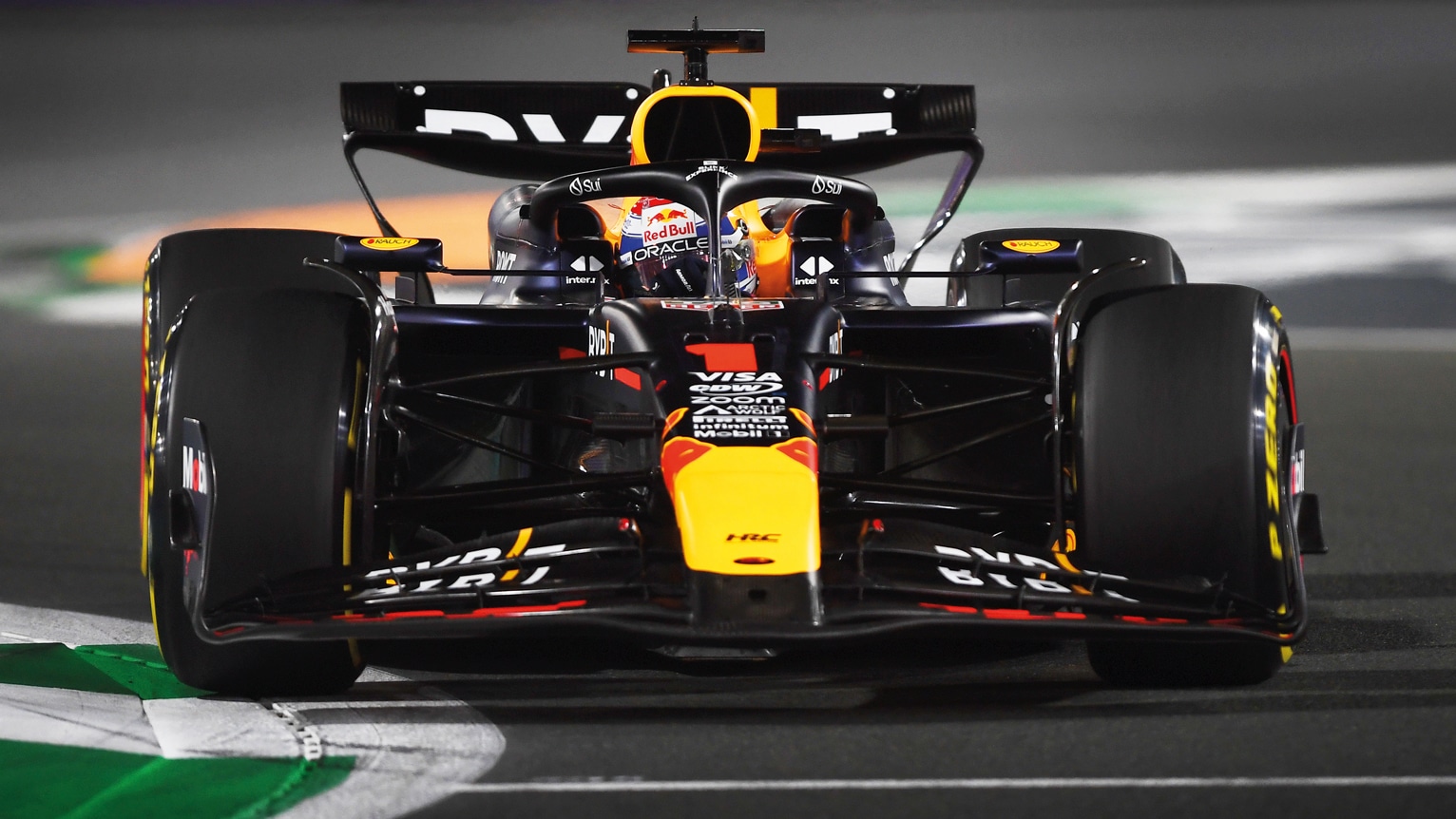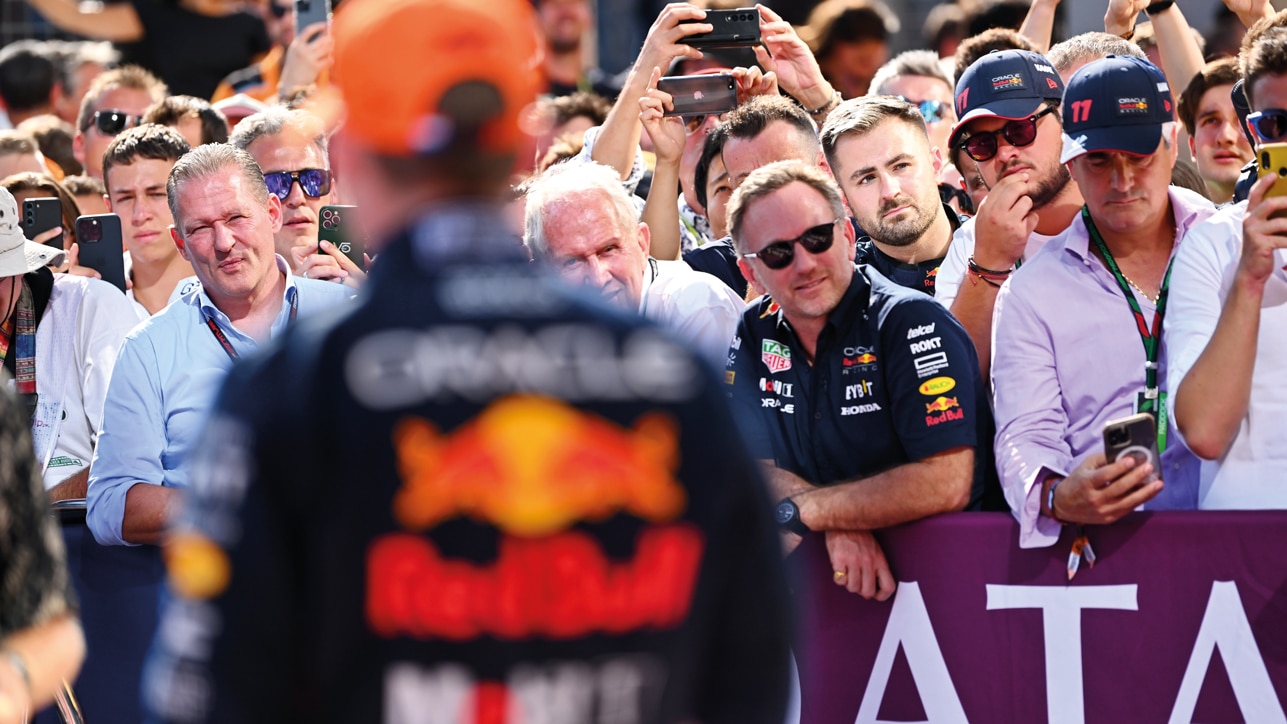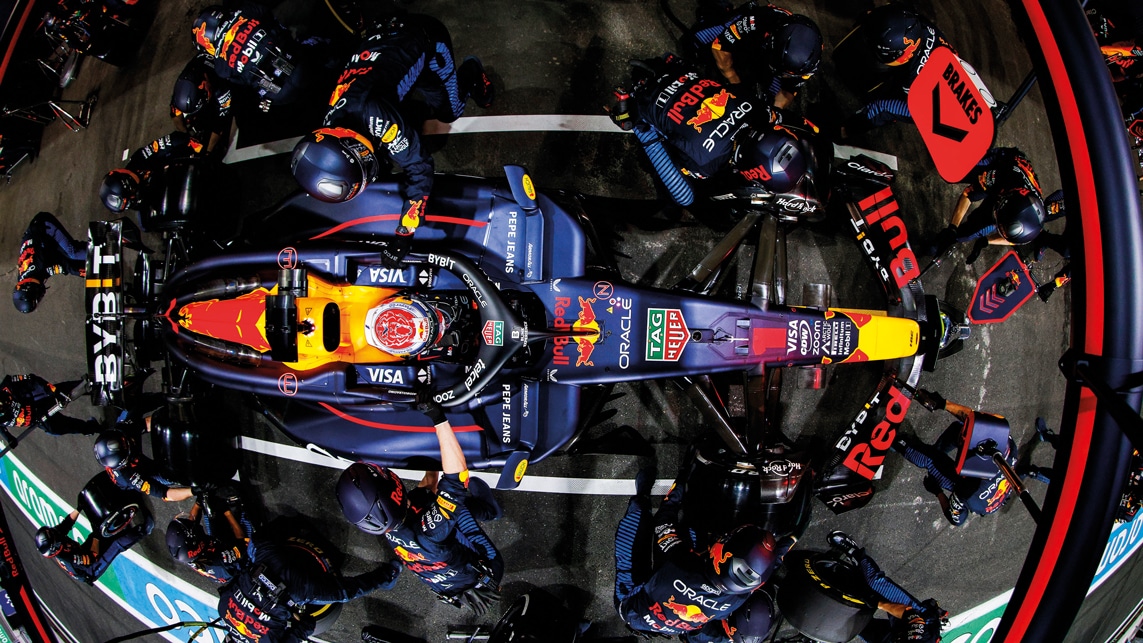The power struggle within Red Bull
While Max Verstappen cleans up on track, behind the scenes we are witnessing a battle for the soul of Red Bull Racing, says Mark Hughes
Getty Images
It is not often we witness an F1 team seemingly trying to tear itself apart even as it is setting new records of on-track success. The complaint by a female member of staff against Red Bull Racing team principal and CEO Christian Horner has had the effect of pulling back the curtain on an inner power struggle at play within the wider Red Bull organisation and it is not a pretty sight.
At the centre of this controversy is a woman whose case is fully expected to go legal and who feels she has been wronged, first by Horner, subsequently by Red Bull management which cleared Horner after an investigation and then suspended her. She has appealed the decision as the first part of what is expected to be a full legal case. She has also reportedly lodged a complaint with the sport’s governing body claiming Red Bull has breached the FIA’s code of conduct. As the legal case is still ongoing we defer from making any further comment on the merits of her claim with full neutrality.
But the power struggle the case has revealed is now making the headlines and was in play beneath the radar even before the woman’s complaint about Horner’s alleged behaviour. At the time of writing, an uneasy truce seems to have broken out, but not before Max Verstappen responded to rumours of Helmut Marko’s dismissal by stating that if this were to happen, then he would leave too, regardless of him being in the process of demolishing the field on track in a series of incredible cars provided to him by the team. When similar rumours of imminent dismissal had surrounded Horner, Verstappen’s endorsement of him was much more measured and with no underlying threat behind it.
Marko vs Horner. The Verstappens – father and son – vs Horner. The Austrian shareholders vs the Thai shareholders. Marko vs the Austrian management. Horner vs both. This story has elements of all those struggles within it.

Max Verstappen seems to have sided with Helmut Marko in the Austrian’s power struggle with Christian Horner
What has happened to create such rancour? This far pre-dates the woman’s complaint which has simply been seized upon as part of the internal wranglings. It’s all caught up in the complex ownership structure of the phenomenally successful soft drinks company and the impact of the death of its co-founder Dietrich Mateschitz in late 2022.
“Mateschitz ran the operation. The Thai side was a sleeping partner”
Although only a 49% shareholder in the company he co-founded with Chaleo Yoovidhya, the inventor of the original drink from which Red Bull was derived, Mateschitz ran the operation. The Thai side has always been a sleeping partner.
Mateschitz’s management style was unique, relying heavily on his personal charisma and vision. The freewheeling image he sought to give his drink was embodied in him. A sort of benevolent dictator who didn’t so much dictate as shine his approval on those who gave him what he sought and as such he was hugely liked and respected. The company ran on people guided by his low-key but powerful persona. His death from cancer left a huge power vacuum.
Horner, as one of the most successful team bosses in F1 history, has become powerful in his own right. He owed much to Mateschitz who put him in charge of his new F1 team in 2006 at just 32 years old. But to the organisation itself? Perhaps not so much. He repaid Mateschitz’s faith in him many times over by building a dazzlingly successful team which has been a huge part of Red Bull’s immense global profile. Technically though, he was still just an employee. Perhaps that has rankled, especially as the achievements have built. Certainly, it’s a point his rival, Mercedes boss Toto Wolff, is never shy of underlying. When Horner was asked a few years ago if he had any words of congratulation for Wolff’s part in Mercedes on-track success, he waspishly replied that Wolff had done very well “with the team he had inherited”. Wolff – who is a one-third owner in Mercedes F1 – replied with, “Not inherited. Bought.”

Max Verstappen seems to have sided with Helmut Marko in the Austrian’s power struggle with Christian Horner
It would be only natural in the wake of Mateschitz’s death that Horner might seek to have a greater say in the decisions affecting the team he had built up with Mateschitz’s backing. Rumours abounded that Horner wished to take an equity stake in the team and that he had enlisted the help of Chalerm Yoovidhya (son of the co-founder Chaleo – who died in 2012 – and inheritor of his 51% share) in raising the finance to do this.
One fly in the ointment for Horner regarding this plan was Helmut Marko, the former F1 driver and Le Mans winner and close friend of Mateschitz’s. Marko has never answered to anyone in his life – and that included even Mateschitz, who was his boss on paper only. Mateschitz had introduced himself to Marko as a teenage racing fan in the late 1960s as Marko, already an emerging star, was taking part in a hillclimb competition. They became firm friends from that day and as Mateschitz later succeeded in his business operations, Marko was able to guide him on Red Bull’s sponsorship presence within racing. Mateschitz took all his racing advice from Marko. Mateschitz was the money and the man with a vision for how he wanted Red Bull portrayed. Marko was the racing man who informed and influenced his decisions, and the guy who found the talent from racing’s junior categories. Sebastian Vettel was the first world champion to arise from this programme, driving to four consecutive titles in the team Horner had built up, not least through his key hiring of F1’s greatest technical mind, Adrian Newey.
Marko had also been instrumental in getting Horner’s team ownership career started, although only tangentially. Horner had bought the assets of Marko’s F3000 team when Helmut decided to close it and concentrate on his project with Mateschitz. With that link established, and with Red Bull sponsorship, Horner’s two consecutive F3000 titles made him a natural candidate to run Mateschitz’s new F1 team in 2006, given that Marko had no interest in the role himself. To give an idea of his part in the Mateschitz-era structure, Marko was given carte blanche to make the necessary changes to the Jaguar F1 team Mateschitz had bought. In a discussion with the former Jaguar management about a new building, Marko was told it would be something they would consider. He responded, “Maybe it’s my poor English – I’m not asking, I’m insisting.” This created a volcanic fall-out which led to the dismissal of that management team – and of Horner’s insertion into the role.
Marko is employed by the parent company, not by Red Bull Racing. But he sits as a director of Red Bull Racing. He is a roving presence, and during Mateschitz’s time was endowed with an importance way beyond his official responsibilities. His decisions (and his sometimes controversial comments) impacted upon Horner’s Red Bull Racing team but he was not answerable to it and was therefore outside of Horner’s control. Horner – who just beneath the polished charm is intensely competitive and hard-nosed – had to work around Marko’s more straightforward and abrasive style. Marko frequently ran random interference in Horner’s smooth running of the team. Having played his part in putting Horner in the role, it’s hard to escape the conclusion that Marko has always looked upon Horner as a junior, regardless of how much success he amassed as team boss.

For now, it’s business as usual for the world champion
Marko’s status within the organisation was of course enhanced by the driving talent he brought to the racing team’s doors. He’d found Vettel but he believed he had found someone even more extraordinary in Max Verstappen, the teenage karting sensation and son of former F1 driver Jos. He could see the vast talent, the attitude, the discipline instilled in him by Jos. He loved the straightforward Dutch way he expressed himself, so similar to his own. But try as he might, Marko could not convince Jos to bring Max into the Red Bull junior programme. Jos was absolutely determined not to cede control of his son’s career until the last possible moment, keeping his options open, keeping him in charge of their destiny. Jos used Marko’s absolute conviction about the scale of Max’s talent to leverage Toto Wolff’s interest in him. In that way, even without having been on the Red Bull Junior squad, Verstappen became a full-time F1 driver at 17. He won his first grand prix on his debut with the senior team at 18. The rest is history. The bond between the Verstappens and Marko is strong.
This would come to have significance as Marko’s status within the Red Bull group naturally became more ambiguous upon the death of his friend Mateschitz. A conventional management structure was put in place, as Mateschitz’s son Mark Mateschitz did not wish to take over the role of his father. Oliver Mintzlaff was made CEO of Corporate Projects (which controls Red Bull Racing) and Franz Watzlawick was made CEO of the whole group. Appropriate structures were set up beneath them to control what had become a massive operation under Mateschitz, but which could no longer be feasibly run in the way it had been when he was around. It was difficult to see how Marko fitted into this and it was assumed he might retire. That was probably what Horner hoped.
It’s not clear whether Horner was looking simply to protect the autonomy he’d been indulged in by Mateschitz in the running of Red Bull Racing or whether he wanted to expand his influence, but rumours of the time suggested he was pushing for Marko to be pensioned off. In his vision of the post-Mateschitz future, there wasn’t a Marko in it. Mintzlaff was rather caught in the middle of the situation. He’d been somewhat bemused when he’d tried getting Marko to sign a corporate responsibility document and the old man had simply handed it back, saying, “I’ve never signed anything and I’m not about to begin now.” But they worked at the relationship. Marko assured him he still wanted to be involved and that he could help the team transition within the new structure.
That was the tense, slightly uncertain tenor behind the title successes of Verstappen and Red Bull on track. But the complaint against Horner blew those tensions into a full-on crisis. Horner refused to step down. Should Mintzlaff fire him? Even if he’d considered doing so, that course of action was made potentially expensive by Horner’s preparedness to fight – and his contract. He got his independent barrister, a KC, who presented his report to the board which in turn decided there were insufficient grounds to dismiss. Then came the leaks of the apparent (and unverified) WhatsApp messages from Horner to the employee. They could only have been leaked from within the organisation. Marko and Jos Verstappen came under scrutiny. Still, Horner stayed on, leading the team front foot forward. Then Jos’s on-record comment: “The team is in danger of being torn apart if Horner remains in his position. There is tension here while he remains in position. The team is in danger of being torn apart. It can’t go on the way it is. It will explode.”

Verstappen Sr, Marko and Horner remain in uneasy alliance. But for how long?
Getty Images
The longer Horner remained there, of course, the greater his chances of raising the finance to take control (should GmbH be of a mind to sell). Which would presumably mean no role for Marko. Jos seemed to be pressuring GmbH into doing something before that happened. Max then added his considerable weight, by stating very plainly he was not interested in a Marko-less Red Bull: “If such an important pillar falls away, it is not good for my situation and I have told the team that. He is an important part in my decision-making for the future. For me, Helmut has to stay. I have a lot of respect for him and what we have achieved together. It goes very far.” So he would go if Marko went? “The team know this. I have told them.” There are rumours that there is a clause in his contract which would allow him to walk in this eventuality.
Horner appeared to be calling his driver’s bluff when asked about it. “Everybody has a role to play. That’s from the very bottom to the very top. Max is an important member of our team. He’s a valued member of our team. He’s a wonderful driver, but everybody has a role to play in this team. No single individual is bigger than the team. As team principal and CEO, I’m responsible for the running and the operation of this team. So, everybody has to do their part. Max is doing his part, and everybody else is doing their part.
“Marko acknowledged that he might be about to be suspended”
“It’s like anything in life. You can’t force somebody to be somewhere just because of a piece of paper. If somebody didn’t want to be at this team, then we’re not going to force somebody against their will to be here… You can never say never, but if a driver doesn’t want to be somewhere, then they’ll go somewhere else. But I can’t see any reason why anybody would want to step out of this team. I think he’s got a great support around him and he’s doing a wonderful job with a great car.”
Had Marko been involved in the leak? On the eve of the Saudi Arabian Grand Prix, he acknowledged that he might be about to be suspended. He also said he’d need some assurances if he even wanted to remain onboard. But he arrived at the track with Mintzlaff. The two had a meeting. Mintzlaff also met with Horner. The upshot was that everyone was staying in place. Let’s get on with business.
It’s an extremely uneasy ceasefire. In this power struggle Horner wields such power because of his relationship with Yoovidhya. Into this mix bring the loyalty of the Verstappens to Marko. Max holds immense power courtesy of his standing and talent.
Where is arguably the main ingredient in the success, Adrian Newey, in all this? Reportedly highly unimpressed. We cannot take it as read he will support Horner.
So both sides have formidable strengths. It’s very equally poised regardless of rights and wrongs – and it’s difficult to identify good guys in this story. There are ambiguities everywhere. But what might swing it is when the perceived aggrieved innocent in the story – the female employee – decides to take legal action. If it’s established that she has in fact been wronged by Horner and subsequently by GmbH, then does Horner’s position remain tenable? It’s clear the story isn’t finished yet.